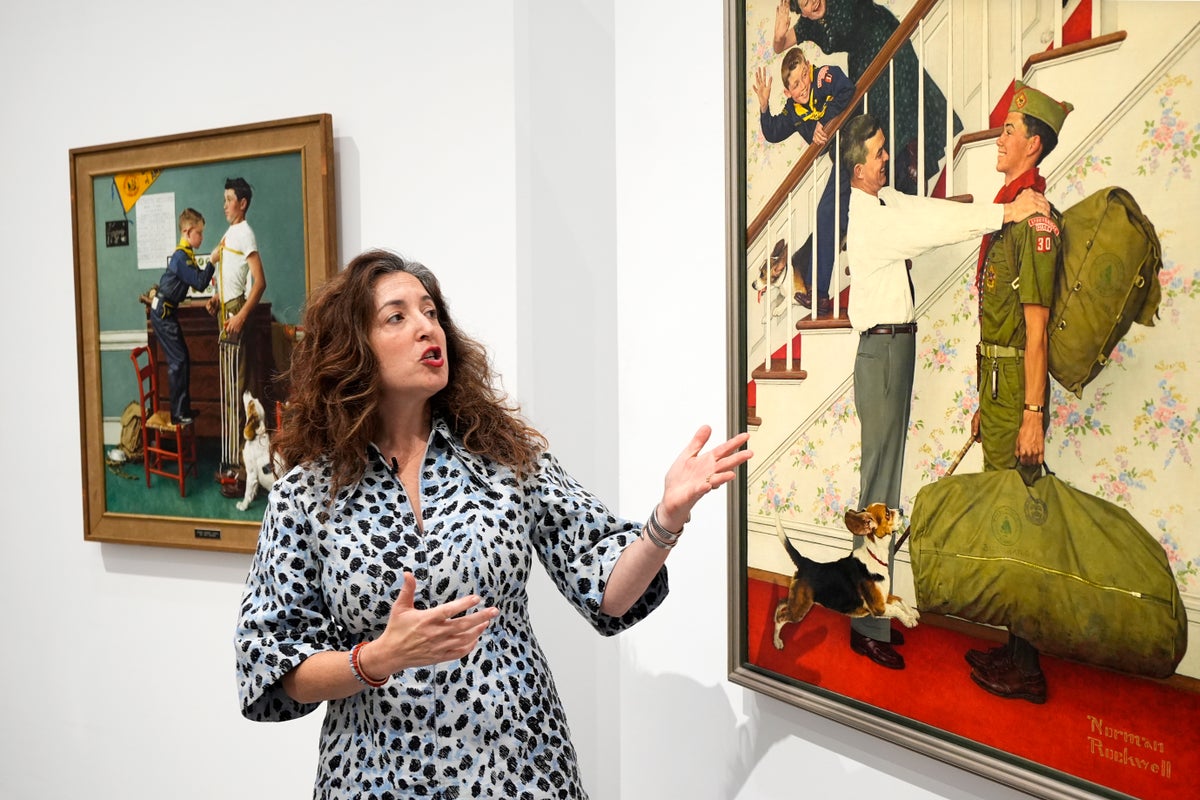
In one Norman Rockwell painting, a family proudly welcomes a beaming Boy Scout home from camp, his duffel bag in hand. In another of Rockwell's achingly idyllic works, a Cub Scout stands on a chair to measure the chest of his older brother, a Boy Scout who has taped his fitness record to his bedroom wall.
Many of the works from the Boy Scouts of America’s collection are as interwoven into American life as the organization itself, having been featured on magazine covers, calendars and even used to sell war bonds. Next week, the works will begin to be auctioned off to help pay the compensation owed to tens of thousands of people, mainly men, who were sexually abused while in scouting.
The collection of more than 300 works, including dozens by Rockwell, is estimated to be worth nearly $60 million, a tiny amount in relation to the organization's multibillion dollar bankruptcy plan. Campgrounds and other Boy Scouts' properties also have been sold to help pay the survivors.
“The idea that an iconic art collection that the Boy Scouts have assembled over many years is being liquidated in order to pay survivors recoveries and to bring them some measure of justice I think is very significant,” said Barbara Houser, a retired bankruptcy judge who is overseeing the survivors' settlement trust.
This year, the 114-year-old organization based in suburban Dallas announced it is rebranding to Scouting America, a change intended to signal the organization’s commitment to inclusivity. The group now welcomes girls, as well as gay youth and leaders.
Compensation to survivors
Hoping to survive a barrage of sexual abuse claims, the Boy Scouts filed for bankruptcy in 2020. The $2.4 billion bankruptcy plan, among the nation’s biggest and most complex, allowed the organization to continue operating while it compensated survivors. It went into effect last year.
Houser said over 82,000 people filed claims during the bankruptcy case and, of those, more than 64,000 have filled out a detailed questionnaire to assert their claims. Survivors will be paid according to the severity of the abuse they suffered.
“Many of these survivors have been waiting decades, literally, for there to be some recognition of what happened to them,” Houser said.
There could be multiple distributions of funds to survivors as money becomes available and further litigation plays out, and how much each survivor gets will depend on how much money the trust collects, Houser said.
So far, nearly 6,000 survivors have elected to receive one-time payments of $3,500 and different settlements are being determined for other survivors, with some payments beginning for them.
In addition to the art sale, those contributing to the trust include insurers and local Boy Scout councils. As of October, over 30 council properties have been sold, Scouting America said.
The survivors
Tom Krumins had only started having conversations with family and friends about being abused as a middle-schooler at a camp in South Carolina when the bankruptcy was filed. It took him months to decide whether to join the settlement.
“It’s the type of bravery and courage that an Eagle Scout should show but at the same time it does feel like you’re ripping away a part of yourself or losing yourself along the way,” Krumins said.
His focus has been the Boy Scouts’ commitments to youth protections, which survivors insisted be strengthened before they would vote in favor of the bankruptcy plan. The money will be helpful but what is most important is “making sure this never happens again,” he said.
Doug Kennedy, a survivor and co-chair of a committee representing victims in the bankruptcy case, said more than three-fourths of claimants approved the plan, but watching the process play out through the courts has been “agonizing” for survivors.
“The reality is for most survivors, all this resolves is the bankruptcy, it doesn’t resolve their pain and it doesn’t resolve what was taken away from them,” he said.
The artwork
The collection will be sold by Heritage Auctions in Dallas in the coming years, including over two dozen works that are going on the block Friday.
The collection includes nearly 60 works by Rockwell, who worked for the organization's magazine, Boys’ Life, at the beginning of his career and maintained a relationship with scouting for more than half a century, including creating images for their calendars.
A work by J.C. Leyendecker depicting a Scout signaling with flags was painted in 1911, a year after the organization was founded. It appeared on the cover of The Saturday Evening Post magazine and was reproduced many times on scouting materials. His 1918 painting of a Boy Scout clutching a sword in front of a flag-draped, shield-wielding depiction of Lady Liberty was adapted as a poster to sell World War I bonds.
“Many artists were really involved in sort of cementing the culture and the vision of the Boy Scouts,” said Aviva Lehmann, Heritage’s senior vice president of American art.
For the past four years, the works have been on display at the Medici Museum in Ohio. Before that, some had been on display at the National Scouting Museum.







